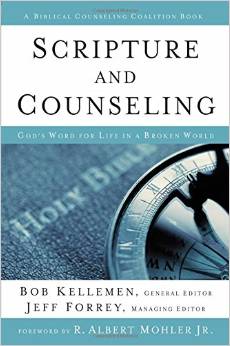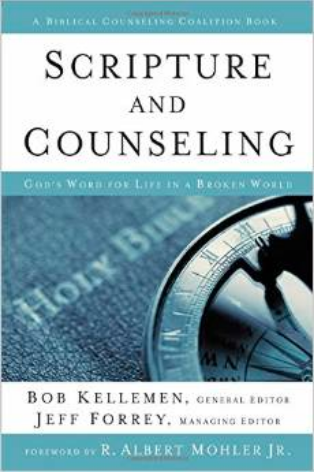Scripture and Counseling: God’s Word for Life in a Broken World

A Denver Seminary Book Review by Denver Seminary Professor of Counseling, Dr. James Beck

Kellemen, Bob, and Jeff Forrey, eds. Scripture and Counseling: God’s Word for Life in a Broken World. Grand Rapids: Zondervan, 2014. Hardback. ISBN 978-0-310-51683-5. 480 pp.
Kelleman, Robert W. Gospel-Centered Counseling: How Christ Changes Lives. Grand Rapids, MI: Zondervan, 2014. Paperback. ISBN 978-0-310-51613-2. 312 pp.
This pair of books represents the current state of thinking and writing in the biblical counseling movement, an approach launched in 1970 with the publication of Jay Adams’ Competent to Counsel. In the past 45 years, the movement has become a chosen template in many conservative, Protestant circles for understanding the counseling needs of people and how to help them. Now the movement can boast of training programs in colleges and seminaries that prepare counselors for work in churches and clinics around the nation.
The Kellemen and Forrey volume contains edited chapters by 20 authors covering a wide variety of applications of the biblical counseling model. Authors discuss how to use biblical counseling as an adjunct to the preaching and teaching ministries of the church, how to use with effectiveness the various genres of Scripture, and the underlying assumptions of the movement.
The Kellemen volume serves as an introductory textbook for biblical counseling as currently understood and practiced. Counselors are viewed as ministers who apply biblical wisdom to human struggles and as representatives of the Great Physician. These soul physicians are encouraged to pursue their work prayerfully and confidently; the emphasis is clearly focused on how much the method can accomplish, not on its limits or limitations.
A key theological underpinning evident in both volumes is the sufficiency of Scripture (as understood by practitioners of this counseling method). The biblical counseling movement envisions the emotional and psychological struggles of people as essentially spiritual problems. As such, they have spiritual solutions. To put it another way, human problems reflect a deficient view of God, spiritual adultery, a fallen heart, self-centeredness, or lack of maturity in Christ. The solution to these spiritual maladies involves spiritual growth, confession, spiritual discipline, prayer, and other spiritual interventions. The Bible, assert these advocates, is totally sufficient in these matters.
The applicability of the theological construct of the sufficiency of Scripture to the counseling needs of people depends primarily on the definition we adopt regarding those counseling needs. The biblical counseling movement has consistently defined these struggles as essentially spiritual in nature. Other approaches to Christian counseling have defined these struggles more diversely: psychological, developmental, environmental, genetic, chemical, emotional, characterological, and/or self-inflicted, each with spiritual ramifications and implications but not all essentially spiritual in nature. Ignoring the spiritual dimension is unwise; but seeing only the spiritual dimension is dangerous. A rough analogy would be to say to a tubercular patient: “You need to breathe clean, fresh air and get good daily exercise.” The advice is good but hardly comprehensive.
On a more personal note: I have wondered what would have happened to our granddaughter who suffered from a profound eating disorder during her adolescence. Would the outcome of her journey through this dark, complex maze of human suffering have been successful (as indeed it has been) if her parents had attended a church that insisted on biblical counseling only for her? What if the parents had not utilized the very best of medical, psychiatric, and psychological interventions for their daughter? What if the biblical counselor recommended by their church had worked with Jane (not her real name) to teach her how to put off the old nature and put on the new nature, to relish in the grace of God, and to confess every sin as her weight continued to drop perilously close to morbid levels? Would we have lost her?
These books commendably describe how we can work with struggling people to build them up in their faith and in their walk with God. But these books fail to establish that such interventions are sufficient.
James Beck, Ph.D.
Professor of Counseling
Denver Seminary
February 2015
